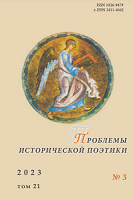Пасхальное измерение медицинской темы Достоевского
The Easter Dimension of Dostoevsky’s Medical Theme
Author(s): Vladimir Nikolaevich ZakharovSubject(s): Christian Theology and Religion, Russian Literature, Health and medicine and law, 19th Century, Sociology of Literature
Published by: Петрозаводский государственный университет
Keywords: Dostoevsky; medicine; illness; death; Easter; resurrection; scripture; legend; full realism; Christian realism; novel;
Summary/Abstract: The medical theme in Dostoevsky’s work attracted the attention of critics already during his literary debut. Readers were shocked by the anthropological discoveries in the novel “Poor People,” impressed by the medical aspects of St. Petersburg novels and novels of the 1840s. Dostoevsky had ex- tensive medical knowledge, knew the symptoms of various diseases, jokingly treated his heroes. Already in his first novel, the idea of restoring man in man, creating genius in Makar Devushkin, was expressed. The rebirth of the writer’s beliefs in penal servitude led to the evolution of his views, expressed in the political lyrics of 1854–1856, the Siberian Notebook, epistolary heritage. The Easter idea became a key one in Dostoevsky’s ideology and creativity, from “Notes from the Dead House” to “The Brothers Karamazov” and “The Writer’s Diary”. Its expression in poetics is peculiar. In Holy Scripture and Tradition, the dead sometimes rise again. The religious truth is immutable: Christ is risen, the soul is immortal, after the time has passed, the dead will rise again. In Dostoevsky’s novels, death is not a miracle. Doctors don’t resurrect the dead. Christ resurrects. The author and the deceased heroes of the novels are resur- rected. This is the paradoxical effect: the dead resurrect the living. Dostoevsky’s “full realism” does not imply posthumous miracles. In Dostoevsky’s novels, the same model of creativity operates, as, for example, in the novel “The Brothers Karamazov”. Brother Markel died, but Zosima was confirmed in the service of Christ; in the chapter “The Corrupting Spirit” the elder rested, but Alyosha Karamazov rose and rose in the “Cana of Galilee;” Ilyusha Snegirev did not rise, but Alyosha and the boys found the truth and meaning of their future existence. The paradoxical poetics of the novel exhaustively characterizes Dostoevsky’s Christian realism.
Journal: Проблемы исторической поэтики
- Issue Year: 21/2023
- Issue No: 3
- Page Range: 46-61
- Page Count: 16
- Language: Russian

